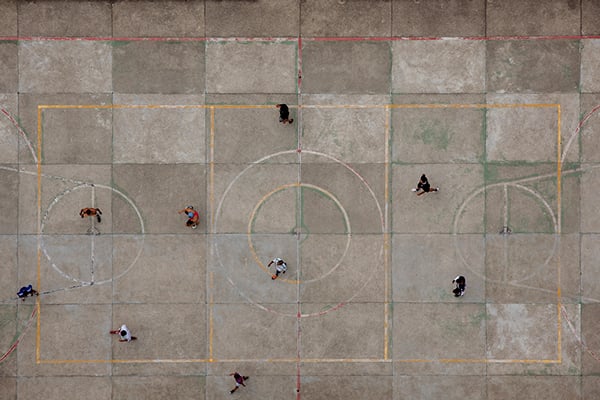
Renato Stockler, from the “Terrao de Cima” series.
Photo: Renator Stockler.
While most of the world’s eyes are trained on the country’s super-sized arenas for the World Cup, Brazilian photographer and journalist Renato Stockler has captured stunning vistas of Brazil’s urban soccer fields. The photo essay, titled “Terrão de Cima,” casts inner-city soccer fields as terrão, or urban oases, reports the Creators Project.
Renato Stockler, from the “Terrao de Cima” series.
Photo: Renator Stockler.
While Milwaukee’s Nomad World Pub was being criticized for its cultural insensitivity for building a faux-favela as part of its World Cup celebrations (see Hyperallergic article), Stockler was taking to the skies of Brazil to capture the realities of life in the country’s hillside slums.
Renato Stockler, from the “Terrao de Cima” series.
Photo: Renator Stockler.
The real face of Brazilian soccer, far from the expensive stadiums and the attention of the mainstream media, are these simple fields of dirt, sand, or weathered grass, surrounded on all sides by the encroaching city. Some are the property of local soccer clubs, while others are public spaces.
Renato Stockler, from the “Terrao de Cima” series.
Photo: Renator Stockler.
It is at such fields that the true spirit of Brazilian soccer dwells, says Stockler. According the photographer’s artist statement, there is an urgent need “for public and communal places to practice sports.” His images offer “a portrait of those who fight for leisure” in cities such as São Paulo.
Renato Stockler, from the “Terrao de Cima” series.
Photo: Renator Stockler.
“These fields are increasingly rare to see because of property speculation and land occupation,” Stockler adds. Those that remain offer a breath of fresh air and a respite from “the hard daily life of those who lives in the outskirts of Sao Paulo.”
Renato Stockler, from the “Terrao de Cima” series.
Photo: Renator Stockler.
Though many have protested the Brazilian government’s handling of the World Cup (see artnet News report), criticizing it for sparing no expense on the international event while its citizens remain in poverty, Stockler’s photos serve as a reminder of how important the sport is to Brazilian culture, and how it helps build tight-knit local communities.
“The rawness of a terrão can’t be fitted as a media spectacle,” says Stockler.
Renato Stockler, from the “Terrao de Cima” series.
Photo: Renator Stockler.